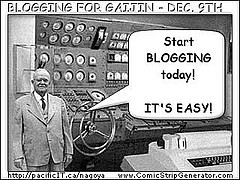By Hector Cisneros
 | |
| Courtesy of Pixabay |
So
people are saying need to blog to be successful on the Internet today. However,
you’ve also heard it takes too long, and you feel you don’t have the skills nor
the time to really make blogging work for you. You may feel that it’s the right
thing to do, but you really don’t know where to start.
The
reality is, the best way to start blogging is to assess your skills, increase your
knowledge of what tasks lie ahead, roll up your sleeves and dig in. To be honest,
that’s how I started, but I also had an advantage. A mentor, Dr. Ivan Misner, took
the time to teach me and many other Business Network International (BNI) professionals
the blogging ropes. In this article, I’ll address the many complaints and excuses
that business people make for not blogging. I’ll impart much of what I’ve learned
during my own mentoring process and will pass on some of the techniques I discovered
on my own. If you’re ready to start learning
the Blogging Secrets of the Pros, read on and get ready to discover the exciting
life of writing prose.
Why Blog?
Blogging allows businesses to publish without the constraints of the
20th century. We’re no longer beholden to publishing companies to get shelf space.
More importantly, online blogging is a communications platform that can build your
credibility, grow your business, and expand your sphere of influence far beyond
your wildest dreams. There’s nothing like high quality, relevant content to prove
that you're an expert
in your field. Your blogs become solid proof that you know
what you’re talking about. By the way, when I refer to blogs, I’m really talking
about high quality, 1,000- to 2,000-word articles; not little paragraphs that were
hastily scratched out.
With that clarification in mind, from a marketing point of view, blogging
has many advantages. It provides authoritative content that can be enhanced with
video, pictures, podcast and backlinks. Secondly, it can provide valuable content
for social networks. It can grow a real audience that provides more page views than
Pay Per Click (PPC) in any medium, dollar-for-dollar.
What it takes from you, as a business person, is a real commitment
to produce this high-quality, relevant content on a regular basis, (weekly or twice
weekly). Nine times out of ten, when I hear someone say, “blogging isn’t working
for them”, it's because they lack the commitment to produce consistent, well-written
content. However, once committed to your
success, you’ll learn what you need to know. Events and circumstances will move
in the direction of your focus and mentors and other people will appear in your
life to help you achieve your goals. A strong commitment to your goals will keep
you on track and help make your readership grow.
1. It takes too long. This
is the most common complaint. True, writing can be a time-consuming endeavor. However,
you can save lots of time by employing specific techniques and using pre-defined
blogging models. Once you get used to writing a blog, you will become more efficient
and your task will take between one to six hours a week, depending on your communication
skills. Besides, if you don’t have the time, it can be outsourced for as little
as $600 per month, (to create and publish four articles). I’ve found that working
from an established outline from the get-go
helps me get over any initial writer’s block and also helps me write more efficiently.
This way I’m not always thinking, “Oh no! I have to write another blog. How should
I get started?”
Before I sit down to write, I always outline my blog with these elements:
| blogging (Photo credit: hgjohn) |
Title
Introduction -
Explains the problem or issue; it could also suggest a so
lution or explores
a value
proposition.
Body - Discussed the elements listed in your introduction
Summary
Call to Action
Author’s Bio
First,
I always brain storm for catchy titles. Then I’ll write my intro, which lists what
elements I’ll be discussing in the body. Third, I further outline the body by adding
detail of the individual elements mentioned in the introduction. I then include
a summary statement, which summarizes the main points of the article. I’ll then
include a call-to-action statement, asking my readers to do something such as, “share
this article with a friend,” “please comment,” etc. The last thing I include is
a short, professional bio.
2. I don't know what to write
about. It’s relatively easy to figure out what to write about by just doing
a little research in your industry. Start your Google search by typing in “articles
about XYZ,” (or blogs, choose one). Substitute your industry name or problem for
XYZ, in your query. You’ll find more ideas and relevant content this way, then you
can imagine. You’ll also come up with many
title ideas for your blogs as well. Now I’m not saying to copy and paste or plagiarize
any of this content directly into you’re your own blog (unless you give the author
credit, and some cases, obtain his or her permission in advance), just write your
article from a different angle and use your own writing style. I like to write in
a conversational style and often use passive voice.
| Blogging Research Wordle (Photo credit: Kristina B) |
3. Learning how to conduct research. I partially
answered this complaint with my answer above. Try lots of different queries based on the key
phrase in your industry. Include problems and hot topics you see happening in your
industry. You will never lack for ideas and content. I also suggest using “Google
Alerts,” as it will automate this process even better. It will bring you articles
and blog post on a regular basis without you having to actively conduct a search.
4. Dealing with deficiencies
in language and communication skills. This may include any weaknesses
in grammar, spelling and punctuation. With
modern word processing however, software has made great inroads to solving these
problems. Your word processor can actually “teach” grammar and spelling today. If
you add such other professional grammar and spelling programs as Ginger and Grammarly,
you’ll be able to produce clean English prose with few, if any, faux pas in your
text. Of course, if your old school you can read books about writing, grammar and
punctuation. For example; “The Associated
Press Stylebook” and The Chicago
Manual of Style”? Many of these books are also available in digital
format or as online tools as well.
| blogger.com logo (Photo credit: Colin ZHU) |
5. Not knowing how to use a blogging
platform like Blogger or Wordpress. Both
of these blogging platforms are relatively easy to learn if your goal is to produce
a great-looking blog. If you’re a visual learner, YouTube has tons of video tutorials
about both of these platforms. Just make sure they’re recent videos so you’re not
learning obsolete features about older versions.
| 30 Best Ways to Promote Your Website or Blog - #13 Email Signatures and Business Card | Sales Tip A Day (Photo credit: Sales Tip A Day) |
6. I don't know how to market
my blog. Blogging is a social networking endeavor. The most cost effective
way to market your blog is through social networking. Social networks have little
or no hard cash costs. Your time should be spent posting your blog and other useful
information to your followers. This can include useful articles, pictures, list,
ebook, etc. about your industry and of course, your unique authored articles. You
will also have to spend time inviting followers, building relationships with influencers,
(people who lots of people follow) and followers who are willing to share your blogs
and posts with their fans. Ask your best customers to provide testimonials and reviews.
Have them post these testimonials on their social networks, and always ask your
followers and readers to leave comments and share your post with friends, family,
co-workers and associates. A great
way to make this happen is to be proactive and help others the way you want them
to help you, (givers gain). If you want to learn more about how to build
your social following read “The
Twelve Secrets of Social Media Success” and “Seven
Secrets of Social Media Magnets”. You can also type “Social Media” in
the search box of this blog and find more than a dozen other articles and podcast
on this subject.
7. ROI or the overall costs.
Many non- and novice bloggers are afraid the return on their time and
effort won’t be high enough. Consider this: A blog that’s actively being marketed
through social media, that’s continually engaging followers and influencers, and
that’s consistently producing high quality and useful content will produce more
page views than an equal amount spent on Pay Per Click, dollar-f
| Blog Marketing Cover (Photo credit: jeremywright) |
or-dollar. That’s
right. We’ve seen clients spend $500/ month with the right key words, with good
ads that have been AB-tested, which actually perform worse than the client’s blog,
which cost them the exact same amount per month. (We charge $500 per month to ghost
write blogs for our clients). Furthermore , their AdWords campaign was producing
200+ page views per month while their blog was garnering 500+ page views a month.
This won’t happen with a poorly written blog with mediocre content, that’s produced
erratically, and with inactive distribution. But when all are well executed and
setup correctly, the blog will always win. More importantly, their blogs have a
much higher credibility score, whereas ads pointing to the client’s landing page
has a much lower trust factor. Most small business lack marketing funds, but often
can invest their time instead. If you have the money but little time, outsource
the blogging and make sure you include funds for the social distribution elements
as well.
8. The need for immediate gratification. The truth is there’s no easy way to make a blog
successful over night. You can get on Page One with a lower trust PPC ad over night
with AdWords, but it’s by no means as valuable as an organically produced Page One
listing from a blog post. The good news is that an established blog (one that’s
been producing quality, weekly articles for about three months) can jump onto Page
One quickly because blogger blogs, (owned by Google) are indexed daily. Your well-optimized
blog post can actually show up in Google search much faster than your website or
landing page. Also, if you connect with lots of people (especially through Google+),
your Blogger-posted blog will show
| Blog Machine (Photo credit: digitalrob70) |
up in their key word search (because you are
connected to them via Google+). Google Search gives a priority not only to the key
words that someone types when conducting a search, but also who they are connected
to. Your social sharing and your followers social sharing directly effects what’s
listed in search. The connection here is Google and using Google apps and web properties.
Finally, it’s important to realize that your blog can serve as your
main website. Blogs can hold all kinds of information, just like a website or landing
page. This can include, videos, pictures, lead forms, offers — and yes — you can
even sell right from your blog pages. They can be edited and customized with HTML
5 code. Blogger has zero hosting costs and, because Google owns Blogger, it’s also
indexed daily for Google Search. This means your post will be added to Google’s
search much faster than a regular web page or even a Word Press page.
In this article, I discussed the important role blogs have in online
marketing for businesses today. I listed solutions to eight common complaints/excuses
that business people make for not blogging. I also discussed how blogging can be
a very cost-effective, high-trust marketing tool, which, when used properly, generally
yields better ROI than Pay Per Click campaigns. These eight solutions lay out a
framework for making blogging easier and generate better ROI than many other forms
of marketing. If you’re looking to improve
your credibility and standing in your industry, blogging is a great tool. If you’re
looking to use your industry expertise as a marketing weapon to get more customers
and grow your business, then blogging is
worth your time.
If
you found this article informative, share it with your friends, family, co-workers
and associates. If you’d like to read other articles we've written on this subject,
enter "blogging" in the search box and you’ll find more than a dozen to
choose from. In particular, I suggest reading “The
Secrets of Blogging for Dollars." If you have
something to add, just leave a comment below. I look forward to reading your responses.
If you would like a free copy of our book,"Internet Marketing Tips for the 21st Century,"please fill in the form above in the upper right-hand sidebar and receive instant access to it. Your information is always keep private and never sold.
Hector Cisneros is a partner and COO for Working The Web To Win based in Jacksonville, FL. You can connect with him on Twitter, Facebook, Google+, LinkedIn, and YouTube. He’s also the co-host of Blog Talk Radio’s “Working the Web to Win,” where he and Carl Weiss make Working the Web to Win simple for every business. Hector is a syndicated writer for EzineOnline and is an active blogger, (including ghost writing) and is a published author of three books: “60 Seconds to Success” (on sale at Amazon and B&N), “Internet Marketing for the 21st Century” (get it free by clicking on the link at Workingthewebtowin.com); and is the co-author of the new book, based on he and Weiss’ popular BlogTalkRadio show, “Working the Web to Win,” now on Amazon.com.
Hector Cisneros is a partner and COO for Working The Web To Win based in Jacksonville, FL. You can connect with him on Twitter, Facebook, Google+, LinkedIn, and YouTube. He’s also the co-host of Blog Talk Radio’s “Working the Web to Win,” where he and Carl Weiss make Working the Web to Win simple for every business. Hector is a syndicated writer for EzineOnline and is an active blogger, (including ghost writing) and is a published author of three books: “60 Seconds to Success” (on sale at Amazon and B&N), “Internet Marketing for the 21st Century” (get it free by clicking on the link at Workingthewebtowin.com); and is the co-author of the new book, based on he and Weiss’ popular BlogTalkRadio show, “Working the Web to Win,” now on Amazon.com.
Related articles








Blogging is one of the hidden assets online that can help any company generate and engage an ever growing following.
ReplyDelete